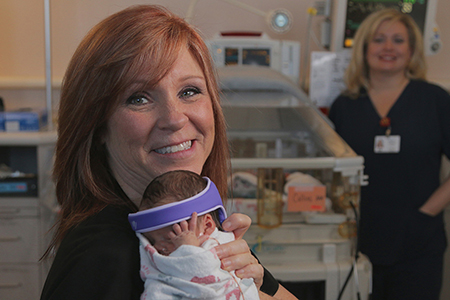
New research from Baylor's neonatal intensive care unit (NICU) could prevent a common infant problem through a never-before-seen wearable product. Currently under FDA review, the Invictus Medical Cranial Support Device (CSD) is an adjustable liquid-filled bonnet that's specially designed to prevent an infant's head from flattening. Baylor's researchers were the first to test the new technology, which works by redistributing pressure on a baby's soft skull.
As part of the local clinical trial, researchers outfitted the tiny headpiece on about 50 premature babies to see if it can prevent flattening and malformations caused when infants sleep on their backs for long periods. So far, results have shown promise in preventing pressure problems that affect about one in two premature babies.
Most parents-to-be already know that babies should sleep on their backs. But as an integral way to prevent infant suffocation, backside snoozing comes with sad complications, including skull deformity.
The problem worsens in preemies, whose ultra-soft heads can't withstand the pressure from long-term rest on a flat surface. In these infants, the skulls can flatten and deform over time spent sleeping tummy-up.
"One of the only downsides of sleeping on the back, especially in the NICU, is that babies develop flattening of one side of their skull, resulting in abnormal fusion of the skull bones," said Mustafa Suterwala, MD, pediatric neonatal hospitalist at Baylor University Medical Center (BUMC) and prinicipal investigator for the CSD trial. "Technically, the condition is called plagiocephaly and can potentially cause deformities of the skull and face as well as long-term developmental complications."
Plagiocephaly affects up to 50 percent of premature infants and up to 30 percent of full-term babies. In the past, special headwear devices helped correct these issues, but only at a later age. Prevention was hard to come by.
Enter the Invictus Medical CSD, an adjust-to-fit bonnet that helps a baby's skull lie on surface areas without conforming to them. The bonnet features a special kind of gel technology that displaces the pressure around the entire head. See how it works here.
As the only site in the country conducting this research, BUMC opened the clinical trial in March 2014 to the premature patients in its NICU wing. Since then, researchers have fitted the bonnet on babies 30 to 36 weeks old in six-hour increments. During those six hours, investigators periodically removed the hat and monitored for sores and scalp sweating.
So far, the bonnet has shown few side effects, and while results won't be shared until later, things look quite good for the CSD. And that's a welcome relief, since previous pressure treatments required a bulky, hard-to-fit helmet for weeks after birth. If the CSD does pass muster on this important trial, Dr. Suterwala said, the bonnet could become a commonly used household product for the crib.
"It could probably be used on babies outside of the NICU," he said. "But that's still a couple of years down the line."
Until FDA approval comes, the CSD's home will remain in the NICU on Baylor's tiniest patients.
# # #
MEDIA CONTACT:
Kristine Hughes
kristine.hughes@baylorhealth.edu
office: (214) 820-7556
cell: (214) 755-0010
About Baylor Scott & White Health
As the largest not-for-profit health system in the state of Texas, Baylor Scott & White promotes the health and well-being of every individual, family and community it serves. It is committed to making quality care more accessible, convenient and affordable through its integrated delivery network, which includes the Baylor Scott & White Health Plan, Baylor Scott & White Research Institute, the Baylor Scott & White Quality Alliance and its leading digital health platform – MyBSWHealth. Through 51 hospitals and more than 1,200 access points, including flagship academic medical centers in Dallas, Fort Worth and Temple, the system offers the full continuum of care, from primary to award-winning specialty care. Founded as a Christian ministry of healing more than a century ago, Baylor Scott & White today serves more than three million Texans. For more information, visit: BSWHealth.com
